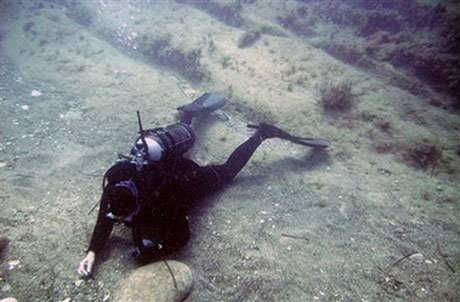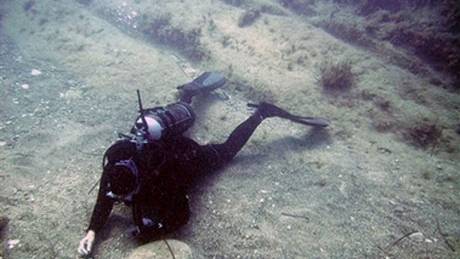Ancient mariner tools found in Cyprus
Source: news.yahoo.com

A diver searches the Aspros area for ancient artifacts off the western coast of Cyprus, Akamas, Wednesday, July 4, 2007. Archaeologists excavating the seabed off Cyprus have discovered the tools of ancient mariners, which they believe were used by foragers more than 10,000 years ago — before the island had permanent settlements. (AP Photo)
Archaeologists excavating the seabed off Cyprus have discovered the tools of ancient mariners, which they believe were used by foragers more than 10,000 years ago — before the island had permanent settlements.
The underwater discovery of what archaeologists said were the oldest materials recovered off the island's coast could shed fresh light on the early history of Cyprus and Mediterranean seafaring.
Earlier this month, divers located the pre-Neolithic finds — chipped stone tools and ground stone implements — in several areas off the western coast, near Aspros, an archaeological site discovered in 2004.
The most significant finds were located in water about 33 feet deep and about 330 feet offshore.
"These are the people who are the pioneers; without their knowledge people who came later maybe would not have had it that good," said Colgate University's Albert J. Ammerman, the survey's director.
Archaeologists say the new discoveries indicate that ancient Aspros was much larger than the landward section visible today. The Aspros site, discovered in 2004, now extends more than 820 feet along the top of a cliff on the north side of the dry Aspros River bed, the archaeologists said.
"All of what we see on the land is just a tip of the iceberg of what is in the water," said Ammerman, whose underwater survey was carried out by nine divers from Cyprus and the U.S.
Aspros, along with a similar site also discovered in 2004 at the tourist resort of Agia Napa in southeastern Cyprus, lies on a coastal formation of aeolianite — old cemented sand dunes.
The archaeologists believe that tools found at the two sites were used by seafaring foragers who frequented the island well over 10,000 years ago — before the first permanent settlers arrived around 8,200 B.C.
They are thought to have sailed from present-day Syria and Turkey, at least 46 miles north and east of the island.
The dawn of seafaring in the region has been put at around 9,500 B.C. from evidence found 20 years ago at Aetokremnos, on Cyprus' southern Akrotiri peninsula.
The finds indicate these early wanderers traveled more widely, and more frequently, than was previously believed, outside experts say.
"This just shows there is a lot more activity than was originally thought," said Tom Davis, an archaeologist and director of the Cyprus American Archaeological Research Institute, who not involved in Ammerman's study. "We're looking at repeated visits around the island."
"These would be people stopping deliberately, coming to the island to use resources, setting themselves with a clear understanding of the landscape," Davis said.
The tools found at Aspros and Ayia Napa are similar to those found at Akrotiri, though precise dating must still be verified through radiocarbon tests, which are in progress.
The era in question coincided with a climatic cold snap known as the Younger Dryas — dated roughly 11,600-12,800 years ago — when the sea level was some 200-230 feet lower.
Rising seas subsequently submerged much of the ancient coast.
Article from: http://news.yahoo.com/s/ap/
20070720/ap_on_sc/cyprus_ancient_mariners_
6;_ylt=Aopb_K53pkBWm0FyFwzKPuJFeQoB






















